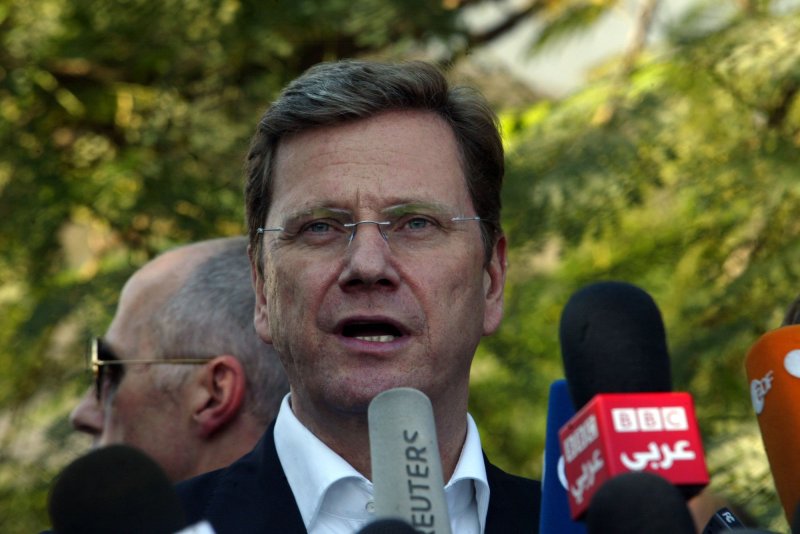German Foreign Minister Guido Westerwelle. UPI/Ismael Mohamad |
License Photo
HANOI, Vietnam, June 7 (UPI) -- Germany and Vietnam are moving closer to a strategic partnership as their bilateral relations deepen, German Foreign Minister Guido Westerwelle says.
Westerwelle spent in the weekend in Vietnam signing a series of aid accords and credit extensions with Vietnamese Prime Minister Nguyen Tan Dung.
They addressed specific projects but the overarching context was a move toward a strategic partnership, local media reports indicated.
Westerwelle said Saturday that Germany wants to improve "comprehensive cooperation" between the two countries, with the aim of building their relationship into a strategic partnership.
"The German government has always pursued its unswerving policy to work with Vietnam to bring bilateral relations to the strategic partnership level," the German foreign minister said, a report by the VietNamNet online newspaper stated.
"Vietnam has now as before always cherished relations with Germany and worked hard to gear bilateral ties to a deeper and broader dimension in an effective way," Dung said.
Important areas of potential cooperation between the nations, he said, include economics, trade, education, training, culture and the arts. Trade between the countries stands at $6 billion a year.
Dung and Westerwelle said they were hoping to have a strategic relationship agreement ready to sign when German Chancellor Angela Merkel visits Vietnam in October, the Voice of Vietnam said.
In return, Dung said Vietnam would support Germany's push to become a permanent member of the U.N. Security Council when it is expanded.
The new aid agreements specifically address two projects: $312 million for the build-out of a second line of the new Ho Chi Minh City metro line and $15 million for a vocational training program.
Vietnam's first rail-based rapid transit system is to cost an estimated $1.1 billion. The Japan Bank for International Cooperation provided 83 percent of the financing for the first line and Germany began expressing an interest in helping fund the second line in 2008, the transit industry journal Railway-Technology.com reported.
An increase in German development aid earmarked for Vietnam was also on the table at the weekend meeting. Hanoi said it is seeking more environmental help to adapt to climate change as well as aid in healthcare, education, vocational training and the development of green and renewable energy.
Relations between Hanoi and Berlin have seen an upward swing in recent years. German President Horst Koehler and German Federal Council President Harald Ringstorff visited Vietnam in 2007, and the next year Dung officially visited Germany along with more than 100 Vietnamese business leaders.
Part of what the Vietnamese leaders are seeking is better treatment of Vietnamese minorities living in Germany.
The Minority Rights Group International estimated there were more than 100,000 Vietnamese in Germany as of 2004. A deal was reached between the countries in 1995 to repatriate 40,000 Vietnam nationals from Germany after its reunification, opening the door to improved relations.
Many of the Vietnamese were living as guest workers in the former East Germany and their presence there at the end of the Cold War ignited racial hostility, the minority rights group said.
Dung called on Westerwelle to build better conditions for the Vietnamese in Germany and to help them "better integrate themselves into the local community, contribute more to the host country and strengthen bilateral relations," VietNamNet reported.





